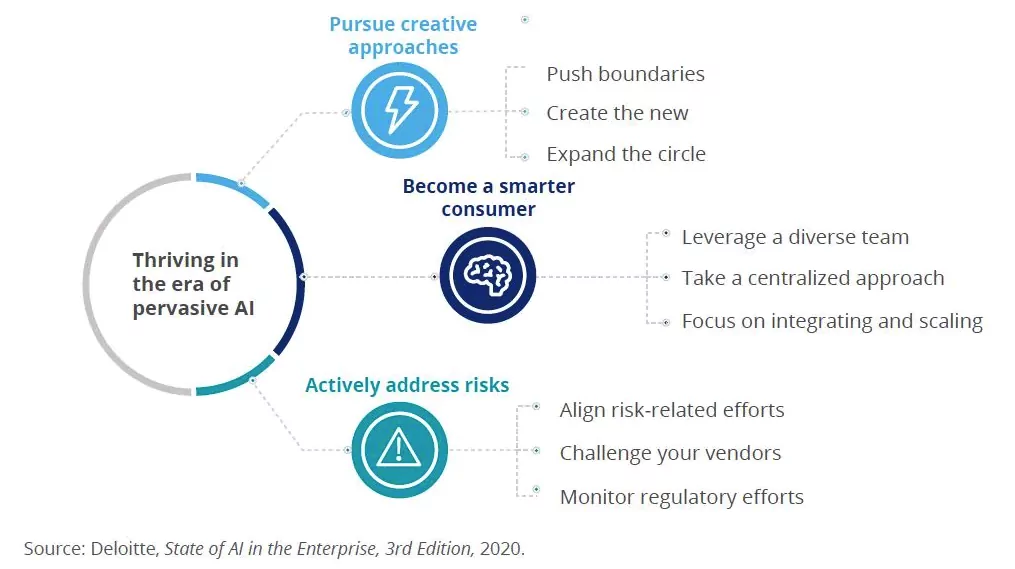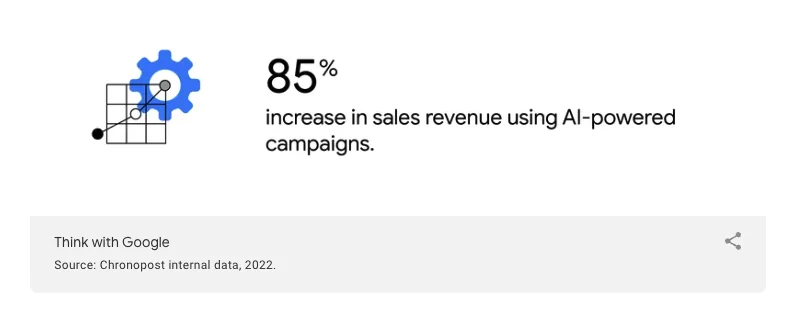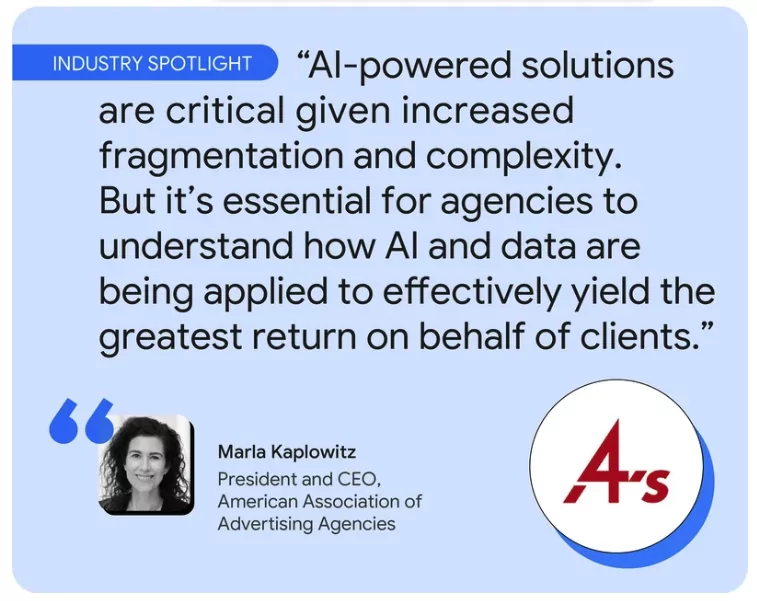
- Red Search
- Resources
- AI Business Statistics
AI in Business & Marketing Statistics: Glimpse Into The Future Of Marketing
-
 Daniel Law
Daniel Law
Artificial intelligence (AI) is rapidly changing the global market as we know it.
Consumers interact with smart assistants such as Google Assistant, Siri, and Alexa, while businesses leverage AI tools and software to streamline marketing and data insights gathering.
It’s easy to ballpark the impact of AI in marketing. But how significant is this impact? Should you need to incorporate AI into your business?
We brought together the latest AI in business and marketing statistics to answer those questions and show how vital AI is in the future of marketing.
AI and its Impact on Businesses
1. 73% of brands use AI to drive success in 2023
A recent industry study reveals that over 73% of businesses adopting AI believe it is critical to their business’ success in 2023.
Today, AI tools can develop content, facilitate customer conversations, and gather valuable insights to stay competitive in Australia’s digital marketing landscape.
Here is a diagram from Deloitte showcasing how AI adopters can benefit from the technology to suit their business goals.

2. 64% of brands use AI marketing tools to stay ahead of competitors
There are tons of AI tools available for SEO and marketing that you can customise to suit your business’s needs.
Statistics show that brands that leverage AI marketing tools such as ChatGPT, SEO copywriting assistants, and big data analytics tools reported an 85% increase in sales revenue amidst Australia’s turbulent economy post-COVID pandemic.
Despite an increasingly competitive niche, complementing digital marketing with AI campaigns enables rapid decision-making and migrating key campaigns right when needed.

3. Leading companies are 28% more likely to use AI for marketing
Over 28% of top retailers will likely use proven AI tools to streamline their marketing campaigns. But while only 15% of them are already aboard with AI, 31% of companies plan to hop in as soon as 2024.
AI and Rapid Campaign Prototyping
Rapid prototyping fosters quick learning and innovation. Artificial intelligence allows businesses to implement a test-and-learn culture to beat the competition.
With AI, businesses could test marketing campaigns in a controlled environment and analyse which works and which doesn’t. You can focus on key performance indicators to determine the most cost-efficient revenue-driven strategy.
4. AI can accomplish ten-year campaigns in one year
Businesses can use AI to understand the customer journey by combining multiple first-party data sources into one hot spot. Many companies reported accomplishing a ten-year marketing campaign within one year by shedding light on the buyer’s journey through AI.
Since technology can now compete with manual labour regarding speed in demonstrating campaign results, businesses now look at an agency’s results and strategic campaign rather than team size and working hours.
5. 41% of marketing agencies switch to growth-oriented and AI-fueled models
More than 41% of marketing agencies are adopting more growth-oriented and performance-based compensation models than traditional retainer agreements.
By switching to AI-fueled business solutions, marketing agencies and SEO specialists can achieve their target business outcomes faster and more efficiently.

But first, what is first-party data?
Businesses and marketing agencies believe that one of AI’s cutting-edge lies in complementing seamlessly with first-party data. It is crucial for our customers since first-party data is:
- Relevant to your business
- Unique from your competition
- High-quality, since it’s insightful data straight from your customers
In an industry survey of 570 companies, 87% of businesses use AI to accelerate growth, respond against market disruption, and strengthen their overall financial performance.
How AI reshapes and redefines marketing
6. AI use among marketers up by 55% from 2018 to 2022
A recent state of marketing study showed that 84% of businesses used AI for their digital marketing campaign in 2020. That’s a whopping 55% increase from 29% in 2018.
7. 52% of successful brands use AI in up to 7 marketing aspects
About 52% of high-performing marketers adopted AI in their campaigns in 2020 and have reported ramping up artificial intelligence for their strategy in the following year.
These brands use AI in the following marketing aspects:
- Customer relationship management (CRM)
- Customer data platform (CDP)
- Advertisement and data management platform
- Marketing automation
- Email service provider/Email campaigns
- Consent management platform (CMP)
- Homegrown solution
8. About 18% of brands are scaling their AI marketing system
Roughly 17-18% of marketers claimed they are scaling their AI marketing adoption. Constantly expanding artificial intelligence across your marketing campaign may deliver sustainable results.
Moreover, 19% have already entered the Humanising phase. That’s where humans work seamlessly with AI to build relationships, culture, and communities and foster customer creativity.
9. 22% of retail leaders use AI-based systems today
About one in five sales leaders rely heavily on AI-based applications, with the marketing teams taking up the lion’s share of AI usage.
Additionally, businesses predict expanding their AI-based applications by up to 155% in the next few years.
That’s because sales and marketing teams will rely more on AI marketing automation, configure-price-quote (CPQ) systems, and targeted advertisement to maximise revenue and efficiency.
AI in Personalised Marketing Statistics
10. About half of B2C consumers prefer a tailored and personalised engagement and interaction
IBM reported that 47% of B2C consumers wanted a brand that could align their marketing and engagement with customer preferences.
Furthermore, 56% of consumers expect a tailored and personalised interaction with the brand or vendor.
That’s possible with AI-based marketing campaigns that would collect first-party data and customise product pages, homepage, and suggested products depending on consumer behaviour and search trends.
11. 71% of buyers expect real-time responses 24/7
AI chatbots are also on the rise, as 71% of customers expect businesses to respond and communicate in real time, 24/7.
A well-designed and personalised AI chatbot should become helpful in sparking engaging conversations with customers that will make them feel valued.
AI Marketing to Drive Revenue and Cost-Efficiency
12. Successful brands put at least 20% of earnings into AI Marketing
A recent global survey on artificial intelligence highlighted how AI could generate value for a company.
That’s why some businesses allot at least 20% of their earnings before interests and taxes (EBIT) to AI marketing development and personalisation.
13. 26% of businesses experienced a 6%-10% revenue increase
From there, 10% reported a more than 10% revenue increase, 26% of brands saw a 6-10% rise, and 43% reported a less than 5% increase in business revenue.
14. About 20% of respondents saved up to 10% of revenue
Adopting AI systems to your business campaigns can decrease overhead and long-term costs by up to 19%. About 13% of local brands saw a 20% decline in marketing costs while achieving better results in the long run.
Streamlining AI for Email Marketing
Artificial intelligence plays a crucial role in streamlining email marketing campaigns to get more engagements with more efficiency.
Here are a few figures showing AI’s impact on email marketing:
15. AI adoption boosted email marketing revenue by 41%
Marketers using AI reported an increase in revenue per email subscriber. With AI adoption, businesses report a 41% increase in email marketing revenue.
Using AI for email marketing minimises operational costs from creating email content, customising it per subscriber, and making tailored product suggestions. With the right tools, marketers can launch extensive email marketing campaigns and let AI do the heavy work.
Moreover, businesses utilising AI solutions get valuable results from 35 million monthly emails, a tad million lower than 36 million emails sent without AI. That marks AI’s efficiency in producing more results with less effort.
The role of AI in Customer Service
AI currently receives the biggest investment in customer service and natural language processing (NLP).
ChatGPT, the most popular AI language model today, can engage in natural conversations by analysing text using a massive neural network to generate a response.
Here are some statistics about the role AI plays in customer service.
16. AI adoption is most prominent in billion-dollar companies
$500M to $1B businesses have fully adopted conversational AI solutions to their customer service, making it the most dominant AI application in the business landscape.
More than 56% of companies report that AI language models disrupt their industry, putting AI-adopting businesses ahead of the pack. 43% of those competitors confirm that they already use AI for customer service.
17. AI will handle 75-90% of product and business queries in 2022
With businesses adopting conversational AI solutions, almost every product and business query conducted on their websites will be facilitated by artificial intelligence.
Conclusion
The global marketing space is ready for robots. Artificial intelligence is becoming more sophisticated, and businesses, marketers, and SEOs are already using it to their advantage.
AI tools and solutions can boost your brand’s marketing campaign and reach the right people for half the effort.
Leverage an AI marketing solution that grows with your brand. Speak with our SEO Sydney specialists today, and we’ll let you know how we can grow your business.
If you’re interested in other industry trends and figures, check out our other statistics articles below!
Written by






